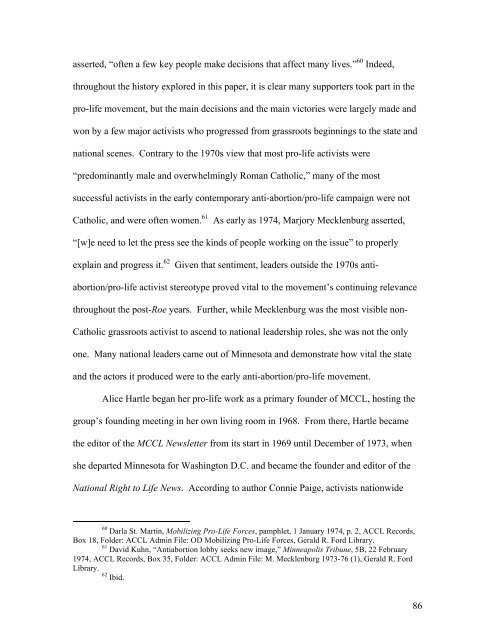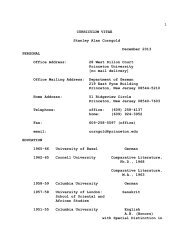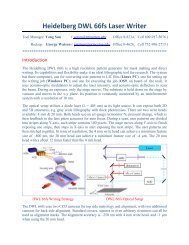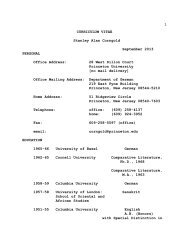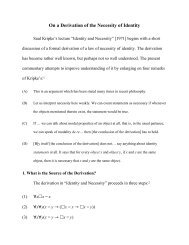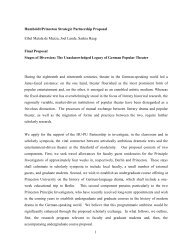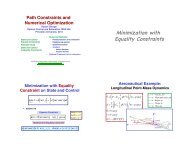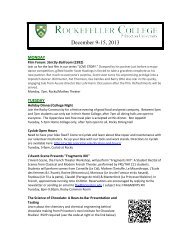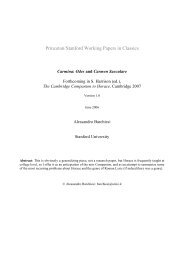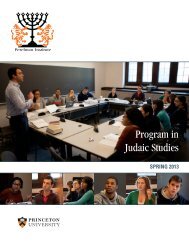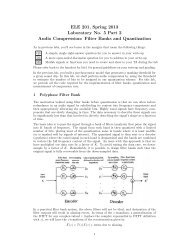The Pre-Roe Pro-Life Movement in Minnesota and New York
The Pre-Roe Pro-Life Movement in Minnesota and New York
The Pre-Roe Pro-Life Movement in Minnesota and New York
You also want an ePaper? Increase the reach of your titles
YUMPU automatically turns print PDFs into web optimized ePapers that Google loves.
asserted, “often a few key people make decisions that affect many lives.” 60 Indeed,<br />
throughout the history explored <strong>in</strong> this paper, it is clear many supporters took part <strong>in</strong> the<br />
pro-life movement, but the ma<strong>in</strong> decisions <strong>and</strong> the ma<strong>in</strong> victories were largely made <strong>and</strong><br />
won by a few major activists who progressed from grassroots beg<strong>in</strong>n<strong>in</strong>gs to the state <strong>and</strong><br />
national scenes. Contrary to the 1970s view that most pro-life activists were<br />
“predom<strong>in</strong>antly male <strong>and</strong> overwhelm<strong>in</strong>gly Roman Catholic,” many of the most<br />
successful activists <strong>in</strong> the early contemporary anti-abortion/pro-life campaign were not<br />
Catholic, <strong>and</strong> were often women. 61 As early as 1974, Marjory Mecklenburg asserted,<br />
“[w]e need to let the press see the k<strong>in</strong>ds of people work<strong>in</strong>g on the issue” to properly<br />
expla<strong>in</strong> <strong>and</strong> progress it. 62 Given that sentiment, leaders outside the 1970s antiabortion/pro-life<br />
activist stereotype proved vital to the movement’s cont<strong>in</strong>u<strong>in</strong>g relevance<br />
throughout the post-<strong>Roe</strong> years. Further, while Mecklenburg was the most visible non-<br />
Catholic grassroots activist to ascend to national leadership roles, she was not the only<br />
one. Many national leaders came out of M<strong>in</strong>nesota <strong>and</strong> demonstrate how vital the state<br />
<strong>and</strong> the actors it produced were to the early anti-abortion/pro-life movement.<br />
Alice Hartle began her pro-life work as a primary founder of MCCL, host<strong>in</strong>g the<br />
group’s found<strong>in</strong>g meet<strong>in</strong>g <strong>in</strong> her own liv<strong>in</strong>g room <strong>in</strong> 1968. From there, Hartle became<br />
the editor of the MCCL <strong>New</strong>sletter from its start <strong>in</strong> 1969 until December of 1973, when<br />
she departed M<strong>in</strong>nesota for Wash<strong>in</strong>gton D.C. <strong>and</strong> became the founder <strong>and</strong> editor of the<br />
National Right to <strong>Life</strong> <strong>New</strong>s. Accord<strong>in</strong>g to author Connie Paige, activists nationwide<br />
60 Darla St. Mart<strong>in</strong>, Mobiliz<strong>in</strong>g <strong>Pro</strong>-<strong>Life</strong> Forces, pamphlet, 1 January 1974, p. 2, ACCL Records,<br />
Box 18, Folder: ACCL Adm<strong>in</strong> File: OD Mobiliz<strong>in</strong>g <strong>Pro</strong>-<strong>Life</strong> Forces, Gerald R. Ford Library.<br />
61 David Kuhn, “Antiabortion lobby seeks new image,” M<strong>in</strong>neapolis Tribune, 5B, 22 February<br />
1974, ACCL Records, Box 35, Folder: ACCL Adm<strong>in</strong> File: M. Mecklenburg 1973-76 (1), Gerald R. Ford<br />
Library.<br />
62 Ibid.<br />
86


